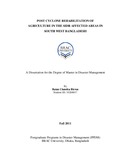Post cyclone rehabilitation of agriculture in the Sidr affected areas in South West Bangladesh

View/Open
Date
2011Publisher
BRAC UniversityAuthor
Biswas, Ratan ChandraMetadata
Show full item recordAbstract
Bangladesh is one of the most disaster prone countries of the world. Every year the
country is experiencing one or more natural disasters like cyclone and flood.
Bangladesh is an agricultural country. But unfortunately this sector faces different
disasters almost every year. So, we should give more focus on the quick rehabilitation
processes so that the affected farmers can bounce back and can contribute to the
normal development. As like other disasters, Sidr that which took place in 2007,
caused huge damage in the southern parts of Bangladesh. Considering the long lasting
effects of Sird, through this dissertation the author tried to identify the impacts of this
calamity on the agricultural sector. Moreover, the coping mechanism of the farmers
has also been identified through this to develop an effective response process so that it
can be used in the upcoming disasters.
To make this dissertation fruitful and to get some ideas from other researchers at first
a literature review has been done. Based on the literature review, a two pages
questionnaire has been developed and used to take interview of the farmers. After
evaluating the primary and secondary data, the study found that very few farmers
could save their crop from the devastation of cyclone Sidr and most of their cattle also
died. The salinity of soil increased alarmingly. Even the ground as well as the surface
water was contaminated due to severe salinity of sea water.
Very few farmers could start their agricultural activities themselves immediately after
the cyclone Sidr due to the crisis of agricultural supports like seed, irrigation, power
tiller etc. The farmers could not plough their land for missing their cattle. Irrigation
system was broken down for contamination of ground and surface water. However,
ultimately they started their livelihood with the help of different organizations like
BRAC, World vision, Wave Foundation etc.
The farmers appreciate these supports but still a few more effective initiatives are
needed. So, the study has suggested taking an integrated agricultural program (seed,
irrigation, pesticide, power tiller, nursing, training etc.) for a better result in crop
agricultural rehabilitation for the upcoming disasters.
